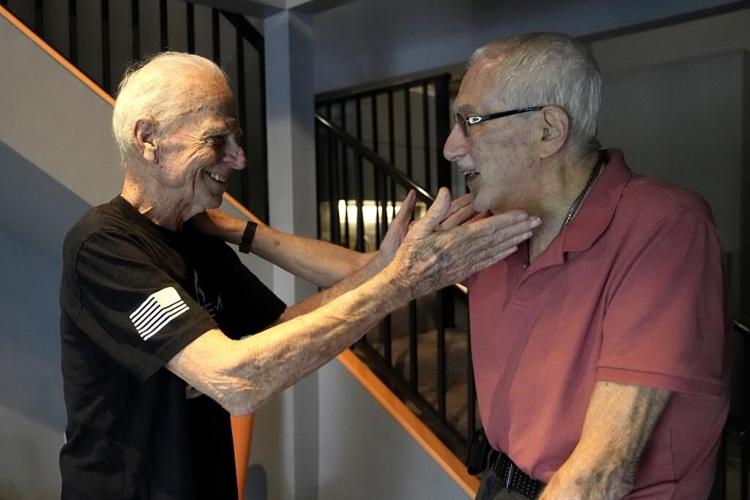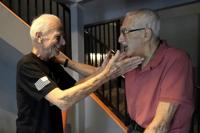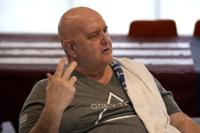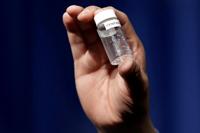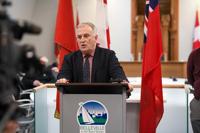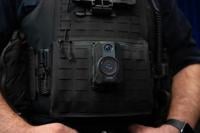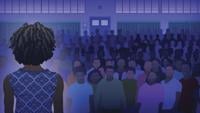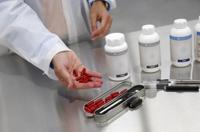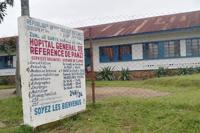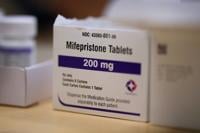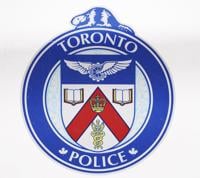BOCA RATON, Fla. (AP) — Before Fred Kalfon began exercising at the Grey Team veterans center a couple months ago, the 81-year-old rarely left his Florida home.
Parkinson's disease, an inner ear disorder and other neurological problems, all likely caused by the Vietnam vet's exposure to the infamous defoliant Agent Orange, made it difficult for him to move. His post-traumatic stress disorder, centering on the execution of a woman who helped his platoon, was at its worst.
Treatment through the federal Department of Veterans Affairs didn't work, he said.
“I felt stupid the way I walk around and stumble,” said Kalfon, who led a medical aid unit as a first lieutenant in 1964-65. “I was depressed.”
But after months in a veteran-specialized gym and recovery program, the retired pharmaceutical researcher and sales manager is socializing and has thrown aside his walker for a cane.
He's among the latest of 700 veterans of all ages working with the Grey Team, a 7-year-old organization combining personalized workouts, camaraderie, community outings and an array of machines in a 90-day program targeted at improving physical and mental health.
“It's the machines, sure. It's the therapy you are taking. It's the (staff's) encouragement — they are there all the time for you. They are caring. Caring makes a difference,” Kalfon said.
The nonprofit center, located in a converted warehouse in Boca Raton, Florida, gets its name, in part, from the brain's nickname: “gray matter." Many of the vets who apply and are accepted into the free program suffered head trauma in battle or have PTSD.
“What we have created here is really magical,” said Grey Team co-founder Cary Reichbach, 62, a physical trainer and former Army police officer. The goal, he said, is to get the vets off medications for their mental and physical ailments when possible. Even after completing the program, participants can still workout, hang out and participate in outings.
With the government saying vets are 50% more likely to kill themselves than non-veterans, Reichbach is proud the center helps combat that statistic.
“We want to tackle the suicidal ideation before it even starts,” he said.
He concedes suicide prevention is easier because the center doesn’t accept clients who are homeless or have uncontrolled addictions.
“I wish we had the funding to tackle” those issues, he said.
The Grey Team’s program features an array of machines using infrared light, lasers and sound waves meant to relieve stress, heal mental and physical wounds and help the vets sleep without the use of pharmaceuticals. The program is run by a primary team of seven, including a medical director.
Drugs are overutilized in other veteran programs, such as those in VA hospitals, often because "they have a budget and they have to spend it,” Reichbach said.
Ohio State University psychologist Craig Bryan, a former executive director of the ��ɫtv Center for Veterans Studies, said the successes of the Grey Team program are not surprising given the selective participant pool.
“They are selecting from a subgroup with less severe problems," said Bryan, a former Air Force captain who now works with the VA.
His skepticism also extends to the effectiveness of the machines.
“To my knowledge, they’ve never been rigorously studied so it’s hard to know if they have any benefit at all and/or if they have side effects or cause harms,” Bryan said. “Exercise is a common feature of many therapies and treatments that have demonstrated efficacy for PTSD, depression and suicide risk."
University researchers are collecting data that Reichbach said he believes will show his program's treatments work.
Reichbach’s 93-year-old father, Ed, offers hugs and back slaps to everyone entering the Grey Team lobby. Sometimes the Army vet and former university professor drops to give 10 rapid-fire pushups — a demonstration to give older vets a jolt on their first visit.
“We have to get them in here, that’s the difficult part," he said.
Upstairs in the center's “safe space” community area, Navy vet Bill Tolle discussed his service as a meteorologist and oceanographer from 1983 to 1990. As a petty officer second-class stationed in Puerto Rico, Hawaii and Antarctica, he never experienced combat.
But in 1988, Tolle witnessed a plane crash at his Antarctic base that killed two people. A year later, he sustained a back injury in a helicopter crash. The back-to-back traumas left him with PTSD. He worked as a firefighter and then a registered nurse in an inner-city emergency room. His PTSD led to alcoholism.
“I really wasn't familiar with what PTSD was. I always thought it was combat-related,” Tolle said. “For years I went untreated and it got progressively worse.”
He finally was diagnosed in 2016 but didn't get treatment until 2020 through a residential VA program. He then lived at the Salvation Army, which introduced him to the Grey Team.
Tolle is a believer in the center's machines.
“My thinking was foggy, at best. A lot of short-term memory stuff. I would forget. I can now think things through, resolve things,” he said. “My whole cognitive function is sharper.”
In the center’s gym, Kalfon talked about walking through Vietnam jungles still wet with Agent Orange, the herbicide sprayed by the U.S. from planes to kill the brush where enemy soldiers hid. It has been linked to veterans’ health problems.
His health began failing about seven years ago. First, a heart attack and quintuple bypass. Then the neurological problems. His health insurance agent told him about the Grey Team and he applied, seeing it as a last hope.
For about two months, Kalfon has been coming to the center three times weekly. He can now walk up stairs and has set a goal to jog 3 miles (5 kilometers).
“When I can do that,” he said, “I think I will have accomplished everything I need.”

